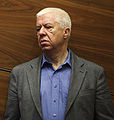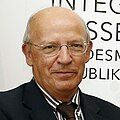| This article needs additional citations for verification. Please help improve this article by adding citations to reliable sources. Unsourced material may be challenged and removed. Find sources: "XVIII Constitutional Government of Portugal" – news · newspapers · books · scholar · JSTOR (August 2016) (Learn how and when to remove this message) |
| XVIII Constitutional Government of Portugal | |
|---|---|
Cabinet of Portugal | |
 Prime Minister José Socrates Prime Minister José Socrates | |
| Date formed | 26 October 2009 (2009-10-26) |
| Date dissolved | 21 June 2011 (2011-06-21) (1 year, 7 months and 26 days) |
| People and organisations | |
| President of the Republic | Aníbal Cavaco Silva |
| Prime Minister | José Sócrates |
| No. of ministers | 16 ministers |
| Member party | Socialist Party (PS) |
| Status in legislature | Minority government |
| Opposition parties |
|
| History | |
| Elections | 2009 Portuguese legislative election (27 September 2009) |
| Predecessor | XVII Constitutional Government of Portugal |
| Successor | XIX Constitutional Government of Portugal |
The XVIII Constitutional Government of Portugal (Portuguese: XVIII Governo Constitucional de Portugal) was the 18th government of the Third Portuguese Republic, under the Portuguese Constitution of 1976. It was in office from 26 October 2009 to 21 June 2011, and was formed by the members of the Socialist Party (PS). José Sócrates, leader of the PS, served as Prime Minister.
Composition
The government was composed of the Prime Minister and 16 ministries comprising ministers, secretaries and under-secretaries of state.
Events
In 2008–09, with the Great Recession starting to hit Portugal and facing recession and high unemployment, austerity was waned as part of the European economic stimulus plan. Nevertheless, support for Sócrates and the Socialists eroded and the ruling party lost its majority in the 2009 election. The second government of José Sócrates faced a deterioration of the economic and financial state of the country, with skyrocketing deficit and growing debt. Austerity was resumed in 2010 while the country entered a hard financial crisis in the context of the European debt crisis.
On 23 March 2011, Sócrates submitted his resignation to President Aníbal Cavaco Silva after the Parliament rejected a new austerity package (the fourth in a year), leading to the 2011 snap election. Financial status of the country deteriorated and on 6 April Sócrates caretaker government requested a bail-out program which was conceded. The €78 billion IMF/European Union bailout to Portugal thus started and would last until May 2014. Sócrates lost the snap election held on 5 June 2011 and resigned as Secretary-General of the Socialist Party. For most of his political career, Sócrates was associated to several corruption cases, notably Independente University and Freeport cases.
References
- "Taking possession of the 18th Constitutional Government, (in Portuguese),". Republica Portuguesa. 26 October 2009. Retrieved 9 December 2016.
- ^ "Portugal > Sovereign debt crisis". Encyclopaedia Britannica. Retrieved 24 August 2018.
- Peres Jorge, Rui (30 May 2017). "2009: O procedimento que ensombra o país há oito anos" [2009: the procedure that haunts the country for eight years] (in Portuguese). Jornal de Negócios. Retrieved 24 August 2018.
- "Sócrates dá primeira entrevista após aprovação do pacote de austeridade" [Sócrates gives first interview following approval of the austerity package] (in Portuguese). Jornal de Negócios. 17 May 2010. Retrieved 24 August 2018.
- "Socrates demite-se". Diário de Notícias (in Portuguese). 5 June 2011. Archived from the original on 28 September 2011. Retrieved 5 June 2011.
- Gomes, Margarida (22 November 2014). "José Sócrates: uma carreira cheia de suspeitas" [José Sócrates: a career full of suspicions]. Público (in Portuguese). Retrieved 24 August 2018.
| Constitutional Governments of Portugal | |
|---|---|
|









